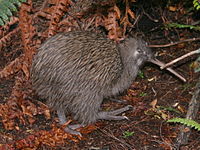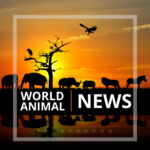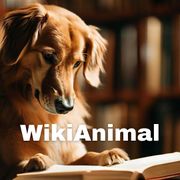Main Page: Difference between revisions
mNo edit summary |
mNo edit summary Tag: Manual revert |
||
| (96 intermediate revisions by 2 users not shown) | |||
| Line 4: | Line 4: | ||
<div id="mp-welcomecount"> | <div id="mp-welcomecount"> | ||
<div id="mp-welcome"><h1>Welcome to '''WikiAnimal'''</h1></div> | <div id="mp-welcome"><h1>Welcome to '''WikiAnimal'''</h1></div> | ||
Everything Animal! | |||
{{Main index}} | |||
{{Main index link}} | |||
</div> | </div> | ||
</div> | </div> | ||
<center> | |||
{{Imbox/Edit WikiAnimal}} | |||
</center> | |||
<div id="mp-upper"> | <div id="mp-upper"> | ||
<div id="mp-left" class="MainPageBG mp-box"> | <div id="mp-left" class="MainPageBG mp-box"> | ||
<h2 id="mp-tfa-h2" class="mp-h2">Featured article</h2> | <h2 id="mp-tfa-h2" class="mp-h2">Featured article</h2> | ||
<div id="mp-tfa" class="mp-contains-float" | <div id="mp-tfa" class="mp-contains-float">{{Home/article}} | ||
</div> | </div> | ||
<h2 id="mp-dyk-h2-1" class="mp-h2">Featured interview</h2> | <h2 id="mp-dyk-h2-1" class="mp-h2">Featured [[Interview:Animal Talk|interview]]</h2> | ||
<div id="mp-dyk" class="mp-contains-float"> | <div id="mp-dyk" class="mp-contains-float"> | ||
{{Home/interview}} | |||
</div> | |||
</ | |||
<h2 id="mp-dyk-h2-1" class="mp-h2">Featured [[Animal:Index|animal]]</h2> | |||
<div id="mp-dyk" class="mp-contains-float">{{Home/portal}} | |||
</div> | </div> | ||
<h2 id="mp-dyk-h2-1" class="mp-h2"> | <h2 id="mp-dyk-h2-1" class="mp-h2">Latest from [[WikiAnimalTV:Home|WikiAnimal TV]]</h2> | ||
<div id="mp-dyk" class="mp-contains-float"> | <div id="mp-dyk" class="mp-contains-float"><center><youtube width="350" height="200">7sJe6z0tuds</youtube></center> | ||
< | |||
< | |||
</div> | </div> | ||
</div> | </div> | ||
<div id="mp-right" class="MainPageBG mp-box"> | <div id="mp-right" class="MainPageBG mp-box"> | ||
<h2 id="mp-itn-h2" class="mp-h2">In the [[ | <h2 id="mp-itn-h2" class="mp-h2">In the [[Headlines:Animal News|news]]</h2> | ||
<div id="mp-itn" class="mp-contains-float">{{ | <div id="mp-itn" class="mp-contains-float">{{Home/news}} | ||
</div> | </div> | ||
{{ | <h2 id="mp-otd-h2" class="mp-h2">This week</h2> | ||
<div id="mp-otd" class="mp-contains-float">{{Home/thisweek}} | |||
</div> | |||
<h2 id="mp-otd-h2" class="mp-h2">Did you know?</h2> | <h2 id="mp-otd-h2" class="mp-h2">Did you know?</h2> | ||
<div id="mp-otd" class="mp-contains-float" | <div id="mp-otd" class="mp-contains-float">{{Home/did you know}} | ||
{{Home/quiz}} | |||
</div> | |||
</ | |||
<h2 id="mp-otd-h2" class="mp-h2">From the [[Portal:Library|library]]</h2> | |||
<div id="mp-otd" class="mp-contains-float">{{Home/library}} | |||
</div> | </div> | ||
</div> | </div> | ||
</div> | </div> | ||
<div id="mp-middle" class="MainPageBG mp-box"> | <div id="mp-middle" class="MainPageBG mp-box"> | ||
<h2 id="mp-tfl-h2" class="mp-h2">About WikiAnimal</h2> | <h2 id="mp-tfl-h2" class="mp-h2">About WikiAnimal</h2> | ||
| Line 69: | Line 59: | ||
</div> | </div> | ||
<div id="mp-bottom" class="mp-box"> | <div id="mp-bottom" class="mp-box"> | ||
<h2 id="mp-other" class="mp-h2">WikiAnimal Projects </h2> | <h2 id="mp-other" class="mp-h2">WikiAnimal Projects</h2> | ||
<div id="mp-other-content">{{WikiAnimal Projects}} | <div id="mp-other-content">{{WikiAnimal Projects}} | ||
</div> | </div></div> | ||
</div> | |||
__NOTOC__ | __NOTOC__ | ||
__NOEDITSECTION__ | |||
Latest revision as of 13:52, 7 May 2024
 | WikiAnimal was founded in April 2023 by a small, but growing, community of animal enthusiasts. If you, like us, are animal fanatics please consider joining WikiAnimal and help spread knowledge, compassion and a love of animals around the world. |
Featured article

Tokoeka are the largest of the kiwi, with males weighing up to 3.3 kg and females up to 4.2 kg. They have soft, brown feathers streaked with black and reddish brown, long pale bills, short legs and toes, and no tail. They are nocturnal, except on Stewart Island where they sometimes forage during the day. They have a keen sense of smell and use their bills to probe the ground for invertebrates, such as worms, beetles, cicadas and moths. They also eat some fallen fruit and leaves.
Tokoeka have distinctive calls that they use to communicate with their mates and to mark their territories. The male gives a high-pitched ascending whistle repeated 15-25 times, while the female gives a lower-pitched hoarse cry repeated 10-20 times.
Featured interview
Beluga Whales with the Alaska Wildlife Alliance

In this episode of the Wild for Change podcast, Teresa Becher and Mandy Migura from the Alaska Wildlife Alliance discuss the endangered beluga whales living in the Cook Inlet. Teresa is the beluga whale monetary coordinator, responsible for coordinating monitoring sessions and being an expert on beluga whale behavior in the area. Mandy is the deputy director and Marine program officer for Alaska Wildlife Alliance, and she coordinates a group of nonprofits advocating for the recovery of the beluga whales. They discuss the decline in the beluga whale population and the major threats they face.
Featured animal

Penguins are a fascinating group of birds known for their cute waddling walk and distinctive black-and-white feathers. These remarkable birds are not just found in icy Antarctica; they also inhabit places like South America, Africa, Australia, and New Zealand. Penguins belong to a family of flightless birds called Spheniscidae. These charming creatures are built for life in the water, with their wings adapted into flippers for efficient swimming. Penguins are expert divers and can spend a significant amount of time hunting for their favorite meals, such as fish and krill.
Latest from WikiAnimal TV
In the news

More news: Animal News | Animal Hub | Newshound
This week
- April 16: Save The Elephant Day
- April 17: Bat Appreciation Day
- April 21: World Curlew Day
- Animal awareness days
- Animal calendar
Did you know?

- The great white shark can have up to 300 teeth at anyone time arranged in 7 rows in its mouth.
- The lemon shark gives birth to live young. Babies swim away quickly to avoid being eaten.
- Fish make up almost half of all vertebrates.
- When a hag fish feels threatened it releases slime from pores making it difficult to catch.
- The sailfish can swim at speeds up to 110 km/h (68 mph).
- Animals General Knowledge Round 1
- More quizzes
From the library

Protecting and connecting landscapes stabilizes populations of the Endangered savannah elephant is a research article published in Science Advances in January 2024. The article discusses the importance of protecting and connecting landscapes for the conservation of the Endangered savannah elephant.
About WikiAnimal

WikiAnimal is an online knowledge base dedicated to the animal kingdom. Its mission is to offer a comprehensive and accessible resource for animal enthusiasts. Here you can find information about all kinds of animals, from mammals to reptiles, from birds to fish, from insects to amphibians. You can learn about their habitats, behaviors, diets, adaptations, conservation status and more.
You can also contribute to WikiAnimal by editing existing articles or creating new ones. Wikianimal is a collaborative project that relies on people like you to share their knowledge and passion for animals.
Join the growing WikiAnimal community in promoting knowledge, understanding, and compassion for animals.
WikiAnimal - founded Apr 10, 2023.WikiAnimal Projects
- Project Animal Talk - feature interviews and blogs from people who are passionate about animals.
- Project Newshound - Newshound is a Really Simple Syndication (RSS) retrieval platform that aggregates animal related content from various sources using RSS feeds. You can then access Newshound in a centralized location to view and stay updated on news and articles from different websites. Newshound algorithms attempt to ensure that you receive timely updates while trying to avoid overwhelming you with irrelevant information.
- Project Species - an ambitious initiative dedicated to documenting the vast diversity of life on Earth. Our mission is to create an exhaustive and comprehensive repository of knowledge about every (as many!) species of animal that inhabits our planet.
